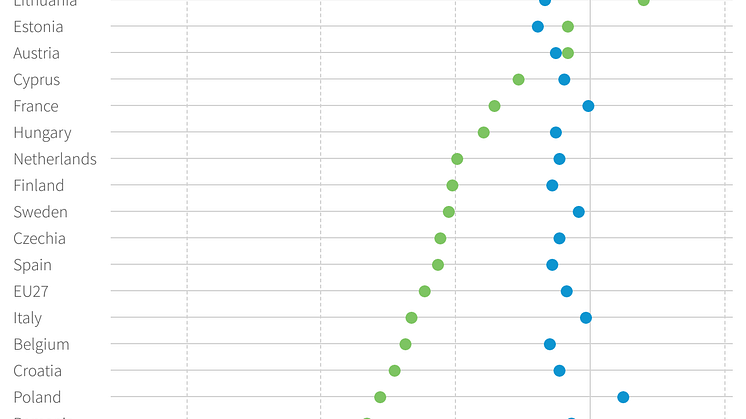
News -
Workers on temporary contracts bore brunt of COVID-19 job loss
Temporary workers, particularly those in non-teleworkable occupations such as services and sales jobs, elementary occupations and blue-collar occupations, were disproportionately impacted by COVID-19 job loss in Europe. Temporary jobs accounted for three-quarters of net job loss in the EU in 2020 while permanently employed workers in teleworkable white-collar occupational categories were largely spared from job loss.
These findings are detailed in the new joint report What just happened? COVID-19 lockdowns and changes in the labour market from Eurofound and the European Commission Joint Research Centre. The joint report describes the employment and working time developments by sector and occupation through the first year of the crisis, and explores which categories of workers were most affected and assesses the extent to which remote working served as a buffer, preserving jobs that might otherwise have been lost.

Click here for background data
In total, there were five million fewer jobs in the EU in Q2 2020 than a year earlier, with this reducing to a deficit of just over three million jobs by the end of the year. The decline in employment was sharpest among young workers and low-paid female workers. The main component of declining labour inputs, however, was not headcount declines in employment but an increase in the share of employed workers not working (furloughed workers). This accounted for around two-thirds of the decline in hours worked at the peak of the crisis.
On a sectoral level, the impact of the crisis was uneven and shaped largely by government lockdowns and social distancing measures. High social interaction, non-teleworkable jobs in sectors such as hotels, sales, restaurants and accommodation experienced the biggest declines in hours worked. Even sectors identified as essential across the Member States saw working hours drop. Conversely, jobs in knowledge-intensive services grew during the crisis as these sectors rushed to transform or digitalise work processes in response to social distancing measures and higher levels of remote work.
The ability to telework spared large sections of the workforce from job loss, and the share of workers working from home during the pandemic was many times higher than those who did so regularly before the COVID-19 crisis. Overall, these teleworkable jobs have proved more resilient and are characterised by better working conditions and higher wages. EU data sources estimate that at least 21% of workers worked from home at least some of the time in 2020, this is still lower than the overall teleworkable share of employment in the EU, which is estimated at 37%. Teleworkable positions are usually held by older workers with higher levels of education, and predominantly by women.
Speaking on the publication of the joint research, Eurofound Executive Director Ivailo Kalfin emphasised that it was the most vulnerable workers who experienced disproportionate socioeconomic consequences in the wake of the pandemic, ‘State intervention and fiscal support is indispensable to protecting economies and labour markets in the face of large, unanticipated shocks such as the COVID-19 pandemic; however, the most vulnerable workers were still severely adversely impacted. It is critical now in the recovery phase that policymakers reflect on how more inclusive social protection schemes can serve as a buffer against an intermittent job recovery, and help vulnerable workers face the digital and green challenges ahead.’
Download the joint report:
Further information:
- Eurofound topic page: COVID-19








